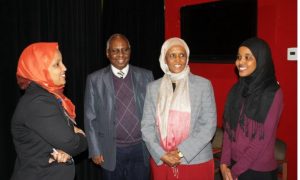By Sahra Noor
In most conversations I’ve had with industry leaders, and in reading published literature about health disparities and the future of health care in both local and global contexts, there’s always been a huge amount of focus given to the scarcity of both human and capital resources. We talk about poverty and its crippling effect on communities. We talk about the shortage of the healthcare workforce, and the “brain drain” that most developing countries experience.
 We place technical expertise and clinical degrees at the center, as if to say that only those with the authoritative know-how have the solutions to fix every problem. These “experts”, who are often men, are the powerful forces in charge of creating the systems and policies that govern healthcare across the globe, so it isn’t all too surprising that they would also dominate the conversation.
We place technical expertise and clinical degrees at the center, as if to say that only those with the authoritative know-how have the solutions to fix every problem. These “experts”, who are often men, are the powerful forces in charge of creating the systems and policies that govern healthcare across the globe, so it isn’t all too surprising that they would also dominate the conversation.
What’s missing in the dialogue is the close attention we should be paying to the real and affective assets that each community already has in place, and what part they play in solving the healthcare problems they face on a day-to-day basis. A particular asset that’s often looked over are the women in these communities who are making a dramatic impact — both positively and negatively.
For example, I know a group of Somali women who are positively changing the health of their community in a creative and sustainable way. They are building bridges between their community and medical “experts,” while sowing seeds of hope in an under-resourced and marginalized community.
A few years ago while working for a large academic health center as a community health director, I noticed that incidents of chronic disease and mental health were increasing in the neighborhood surrounding the hospital, which also had the 2nd highest infant mortality rate in the city at the time.
I ventured to talk to these women and men who were living in the area about these particular issues — particularly, what they felt they needed to improve the health of the local residents. Going into these conversations, I expected their top issue would be the lack of health insurance or culturally competent medical providers at their disposal. While those issues were brought up, the community expressed greater concern about how isolation from the mainstream community, language, cultural barriers, poverty and chronic unemployment were affecting their health. They told me that most of them had access to health care insurance or a doctor, but that there was also a necessity to learn more about America’s complex healthcare system and how to take control of their own health.
 Most community members expressed frustration about the length of time they had with their providers during appointments. They felt as though 15 minutes didn’t allow room to truly share their whole selves and their life experiences, past traumas, moments of joy, and that usually these providers ultimately had control of the conversation — with little attention being given to their needs and values.
Most community members expressed frustration about the length of time they had with their providers during appointments. They felt as though 15 minutes didn’t allow room to truly share their whole selves and their life experiences, past traumas, moments of joy, and that usually these providers ultimately had control of the conversation — with little attention being given to their needs and values.
There were also concerns regarding trust, as many of the women told me they didn’t believe providers when told that there would be no cure for their chronic health conditions. What they really needed, they said, was access to health education, advice and information in their community — all in an environment that was comfortable for them.
What resulted from these conversations was a new model of healthcare outreach and education that sparked the creation of Health Commons — a place for health and wellness that the entire community can gather to learn and exchange dialogue with each other, as well as healthcare professionals.
In order to implement this new model, we formed partnerships among community leaders, religious groups, and anchor institutions like the hospital system I worked for, and a local liberal arts college that offered a transcultural nursing program which had already implemented a similar model for the homeless community in downtown Minneapolis.
After three years of planning, the partnership between a local non-profit run by a well respected Somali physician, the academic health centre, the liberal arts college and a local Sufi mosque, who provided the space we needed for free, was solidified. We also received small seed funding from a local health foundation.
From early on, it was clear that in order to engage all sectors of the community, we needed to get the local women on board as both leaders and facilitators of the work. We envisioned that the glue that would eventually hold the partners and the community together would be these women, because they were the ones most invested in the health of their families and communities.
As a result, we hired 3 women whose job titles were “bilingual community liaisons”. These women were recruited through word of mouth, and while their job descriptions were loosely defined, they mainly provided basic orientation. The only criteria for hire was passion and interest in health and community organizing. We didn’t ask for formal education or degrees.
That was seven years ago. Now, over twenty other women have been recruited to become peer educators. Together, these women have led the transformation of the center and its programming, and in the process, improved the health of their entire community.
With continued training and mentoring from the Somali physician and the nursing faculty from the transcultural program, they helped Health Commons go from a place that was open two afternoons a week and serving 500 people annually, to a center that is open every day of the week that now serves about 5,000 individuals.
The personal transformation of the women is just as remarkable. They went from being shy and intimidated individuals to being educated, empowered, determined and assertive women who teach others and lead many of the center’s activities. The women now facilitate reproductive and child health education workshops, parenting courses, nutrition classes and exercise sessions such as yoga and Zumba. They are not just earning a living, they are transforming the community.
To see their leadership skills develop over time and their remarkable impact is nothing short of a miracle. They have educated the community about healthy pregnancies and the importance of childhood vaccinations. They initiated a family focused nutrition and exercise project with the goal to improve eating habits at the family level and reduce childhood obesity. They have implemented a project aimed at improving heart health and reducing heart-related chronic conditions. They have also created and disseminated educational tools, videos and other resources to the community.
Being part of Health Commons also had personal impact on the lives of these women. Many of them are now pursuing health-related careers. Some have gone through or are in the middle of formal community health worker or doula training, and few are even interested in becoming registered nurses or nurse practitioners.
To see these women flourish as community leaders, and to see what they have accomplished over the past 7 years gives me great joy and hope for the future.
The impact of their work is also notable. During the 2017 Measles outbreak in Minnesota’s Somali community, not a single case of measles was reported in their highly dense neighborhood, which is home to 10,000 Somali and other east African refugees. This is testament and credit to their work. Arguably, their prior 6 years of consistent health education and outreach was one significant factor that has shielded the neighborhood from such an outbreak.
As communities around the world experience vicious cycles of disease and outbreaks, shortage of health care workforce and reduced resources, they would be wise to harness the under-utilized wisdom and asset of community women.
Women are natural leaders, organizers, story tellers and community experts — and when tapped to lead or help, they tend to step up in ways that bring everyone together and exceed our expectations.
Sahra Noor
Email: [email protected]
———-
Related articles
–SIGNS OF HOPE: REFLECTIONS ON HEALTH CARE IN SOMALIA By Sahra Noor
We welcome the submission of all articles for possible publication on WardheerNews.com. WardheerNews will only consider articles sent exclusively. Please email your article today . Opinions expressed in this article are those of the author and do not necessarily reflect the views of WardheerNews.
WardheerNew’s tolerance platform is engaging with diversity of opinion, political ideology and self-expression. Tolerance is a necessary ingredient for creativity and civility.Tolerance fuels tenacity and audacity.
WardheerNews waxay tixgelin gaara siinaysaa maqaaladaha sida gaarka ah loogu soo diro ee aan lagu daabicin goobo kale. Maqaalkani wuxuu ka turjumayaa aragtida Qoraaga loomana fasiran karo tan WardheerNews.
Copyright © 2024 WardheerNews, All rights reserved


